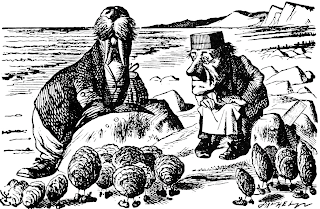Last semester, as I drove my car to and from work every day, nearly every time, I listened to
the album "Poses," by Rufus Wainwright. The ride is short, usually the length of one song. Sometimes I played the satellite radio, but when I did, I had to switch to the CD player a few seconds after I entered the underground garage and the car lost contact with the satellite. My Rufus Wainwright addiction began when I happened to hear the song
"Cigarettes and Chocolate Milk":
Cigarettes and chocolate milk
These are just a couple of my cravings
Everything it seems I likes a little bit stronger
A little bit thicker, a little bit harmful for me
It's a song about addiction, and I got addicted to the song. Over the course of the semester, I became strangely bonded to the entire album. Strangely, because I hadn't gotten attached to a new artist or a sequence of songs in many years. Funnily, one song on the album is
"Grey Gardens," based on the movie, "Grey Gardens," which has always been on the short list of favorite movies in my profile and which
I often rewatch for inspiration.
I felt very close to Rufus Wainwright from January to August in Madison, Wisconsin.
Yesterday, my sister and I were traipsing through the Village and Soho. She wanted earrings and mementos. I balked at going into one store that had big sales signs in the window and -- I took one step up toward the doorway -- looked completely chaotic inside. I'd linger in the place next door until she was done with the chaos. The place that suited me was called
Theory. I prefer Theory to chaos. She rummaged through the chaotic sale store and bought nothing. Not meaning to buy anything, I found two ideal black sweaters at Theory. I resist chaos but am a pushover for a rational pullover and a Cartesian cardigan.
It's a warm day in SoHo, and I'm weighed down by a bag with two heavy sweaters that will make so much sense back in Madison in January. A few stores later, I'm hitting the wall, and I need respite, so let's find our way back to that restaurant,
Provence, that looked so pretty with the tables sticking halfway out the wall of doorways. A perfect choice for someone who almost loves the idea of a sidewalk café.
But now, the restaurant has crowded up, so we can't sit in one of the doorways. But I'm happy to get a seat by a pillar, even with another table -- a big table -- crammed right up to the other side of the pillar, and, of course, I let my sister, my guest, have the seat that looks out toward the doors. I'm recomposing myself with the beautiful French press coffee, and they seat six men and one woman at the big table at my elbow.
Diagonally across from me is a man who looks like Rufus Wainwright or is Rufus Wainwright. I glance at him now and then and try to eavesdrop over the restaurant din. I hear him refer to his mother and to Lorna Luft. I could imagine Rufus Wainwright talking about
his mother -- is the woman at the table his mother? -- and
Lorna Luft. He talks about a party where people talk about rehab, and then seems Rufus-y. Then someone calls him Rufus. So, it's Rufus, then.
I keep trying to eavesdrop -- it's nearly impossible -- there's some talk of religion -- and to converse with my sister. Dell is looking over to the big table more than I am. It's not that she's interested in Rufus Wainwright. As I suspect, and I learn for sure later, she's never heard of him. She's interested in what they are eating. What are those powdered sugar things with the little turd-like berries?
Beignets. What's that metal stand? They're getting oysters.
I think about whether I'm excited to sit for so long so near a person whose music I have so much feeling for. But no, I feel normal, as usual. I remember
the time, more than 30 years ago, when I sat in a restaurant at a table next to John Lennon. The feeling was overwhelming. I am so much older now, but is it that I fell in love with Rufus's music as an older person or that I'm sitting near him as an older person? I could find out if some day I'm sitting in a restaurant and, at the next table, it's Ray Davies. Maybe Bob Dylan. But no. I think it's a theory that can only be tested on Ray Davies.





